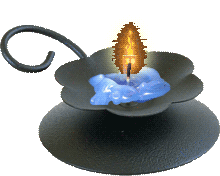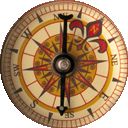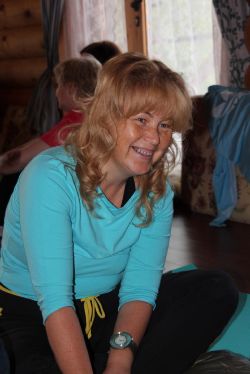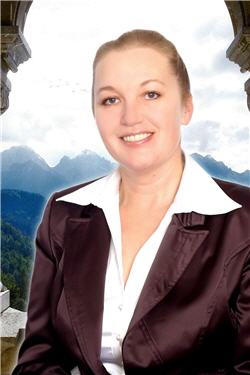
|

|
|
||||||||||||||
|
|
||||||||||||||||
Fear of death is stimulating
13.08.2013
 What is thanatotherapy and how does it relate to death? How to stop being afraid of death without blocking the mandatory self-preservation instinct? Editor of Pravda.Ru Inna Novikova talked about this with Vladimir Baskakov, a psychologist, thanatotherapy, director of the Institute of thanatotherapy and the author of a unique methodology.
What is thanatotherapy and how does it relate to death? How to stop being afraid of death without blocking the mandatory self-preservation instinct? Editor of Pravda.Ru Inna Novikova talked about this with Vladimir Baskakov, a psychologist, thanatotherapy, director of the Institute of thanatotherapy and the author of a unique methodology. Vladimir, to begin with, please tell us about your profession, thanatotherapist, and what exactly you do.
"First of all, let's begin by saying that a profession of thanatotherapist, has never existed and never will because it touches upon the theme of death. We will never become a profession. This has to do with a general attitude towards the culture of death and death itself. First of all, I am a psychologist, and I am primarily interested in the mechanisms of death. We deal with people's contact with their mortality. What will happen if you try to grab a hot pan with bare hands? You will remove your hand immediately. What do we do when we touch upon this subject? We stop contact with it."
The same thing happened to me when I began to research the information about the stages of human transition to another world. I experienced high blood pressure, I immediately felt sick. Precisely like in your example with a hot frying pan.
"You must really engage in it. Look at the simplest example of breath. We inhale, we exhale. We come into this world on an inhale. There's a corporal practice still used when a baby cries and everyone around is rejoicing. We leave on an exhale. Therefore, the last gasp of a dying is just a sign that an exhale needs to occur. Look, for example, at the screen adaptation of Tolstoy's "The Death of Ivan Ilyich" by director Kaidanovsky, where a very good moment is captured. A dying takes a breath, another breath, another breath, and then exhales. In the film, a doctor says "it's over." Death is over. And there is a very interesting phrase, an absolutely amazing one. "'That's it."
Why did you bring this up?
"Because breath is an example. We inhale and exhale. Therefore, an inhale is the beginning, a start of a relationship, a marriage, and so on, that is life. An exhale is a goodbye, farewell, leaving the death. Let me turn a stop watch on and see how long you will live only making inhales, without exhaling."
For example, when a vacation ends and we have to leave, is it life or death?
"If there is a transition, it is death, of course. Everything that has to do with transitions is the theme of death. Let's define what death is, that's very interesting. You know, if you try to find the etymology of the word "death" you will not find such information."
I understand that the antagonist of death is not life. It is more like birth - death.
"It is a very deep observation. If we try to understand this it turns out that death has really no alternative to life."
The worst of all evils, death, has nothing to do with us. Because when we exist, it is not present. When it exists, then life is absent.
"But this is logical. We can agree with logic. But what scares us? The fear of death is a paradox, it is nonsense. How can we fear something that we cannot know while alive?"
But, nevertheless, it is one of the worst fears.
"It reminds me of famous film where one intelligence officer gives another one poison and says "hide it, it's a perfect poison that acts quickly and painlessly." Who said that it acts quickly and painlessly? Anyone who tried it? Like I said before, we have to determine what death is. There is a very interesting legend that the ancient Russ had a mountain called Mera. It was located in the north. Incidentally, this legend overlaps well with eastern legends, with Chinese legends, also about the north. The mountain divided everything in two parts. Therefore, all that is associated with division has to do with death.
So it is a fight, a unity and struggle of the opposites.
"You could say that it is unity and struggle. That is, there are alternatives, and they are linked, of course."
So what is death?
"It is a transition from one state to another. This is what death is, it is present in the moment of transition. Try now to inhale as you exhale."
I don't think I can.
"Of course, you can't, because it is a transition. When a person passes through a door post, does she think that she is burying, say, this room for the sake of the hallway? She is not aware of it. Or take a mirror for example. Go to a mirror, stand in front of it, look, and you will not see yourself, you will see minus yourself. Raise your right arm, which arm is raised there? Then tell a person to touch her right ear with her left hand. The person starts to get confused, the lines are getting blurred. That, essentially, erases the border of death.
"You know that when people die in Russia, the family puts a curtain over all mirrors. Check out Escher's prints, there is so much in there. He has one eye that reflects death and someone looks at this engraving and gets scared thinking "death." In fact, this print is full of optimism, because if your pupil reflects death, the one who looks at death is alive. Hence the appeal of death, the reason why we are so attracted to places where death is present. Accidents always attract plenty of viewers. This is called catharsis."
There are so many deaths around. News programs are filled with information about accidents victims and reports on how many people died, who was hurt, all these horrors. And people watch these reports. Why do they watch them?
"This fear of death is one of the most terrible, the most frustrating of all fears for people. But the fear of death is stimulating."
Perhaps it is. Apparently, the fear of death is stimulating and may ruin the instinct of self-preservation.
"Instincts, of course, are there. But then again moderation is important because it can be so stimulating that this instinct will be destroyed."
It looks like there are people whose fear interferes with their quality of life, do they come to you then?
"Let's differentiate between physiological and psychological fear. Physiological fear is a necessity."
What about psychosomatic fear?
"If a client comes to you and wants you to eliminate, say, her fear of death, if you remove the physiology of fear of death, she will be hit by the first car she meets. The physiological fear of death should be left alone. Psychology is something to work with, when a person sees killers in every dark alley, watches criminal news, etc."
Why thanatotherapy? Why not psychology?
"Well, there are numerous approaches. I'm not saying that this is a unique method, and only this method can work with the fear of death. Going back to the example with the intelligence officers and poison, we, in contrast, offer a safe mode of experiencing what death is, with guaranteed survival. We do not use this method where people are buried alive, this has nothing to do with us."
I heard that a friend of a friend has been sleeping in a coffin for a couple of years.
"This is masturbation on death, what else can I call this? It's not what we do. It is important to model these processes, to model death so that it is unrecognizable. How can this be done? For example, through a session of complete relaxation. We totally relax when we die, for the first time. When we die, we're open, you know, our legs and arms are open, our jaw drops out, our eyes open - everything opens. What does our society do with such bodies? They close everything. Why? Instead of supporting dead body characteristics, such as an open lower jaw, they try to make them look like living bodies."
Anyway, a dead person always means heavy feelings, even if this person is a stranger, it's always unpleasant. If the mouth is open, arms and legs are open, it is particularly disturbing.
"The dead can be transformed in a society where you have to be reserved, cultured, intelligent, with your mouth closed. In a safe space, why do they remain in the position they died in? Why, when we suggest someone to lie down, she lies down, her hands clutching the ground? There is such a professional term that describes the process when we have to grab the ground, we are grounded. By doing this we avoid contact with a therapist or with this reality. People who are ready for contact have their arms open. Therefore, in this session, we model complete relaxation, we do not reach the edge."
Do you mean you can relax but simply rolling your eyes?
"It is not that simple. If someone could relax like this, I would take her around the world showing her as the first person who is completely relaxed. It's impossible to do. Therefore, the methods we offer during our sessions are fundamentally different from all existing approaches to relaxation. I recently got a book "Ten plus one method of relaxation." Why not eleven? These methods are a parody on relaxation, all these Maltz, Schultz, Jacobson, Kamatarius, Godavarty, it is all nonsense.
"Let's take an autogenic training according to Schultz, for example. My hand is heavy and warm. How can you relax through warmth? Think about the Chinese model of Yin and Yang. Relaxation is a Yin component, it is cold, it's night, it's a woman. Who could even imagine that a woman is the Yin component instead of Yang? In the center of Yang figures there is Yin, the quality of the opposite sign. Therefore, in the center of freezing there is a burning source of activity."
It is believed that when people experience hypothermia they feel warmth.
"Of course. Cavers know it, climbers know it. If someone on the team gets hot, she is immediately hit on the face to prevent frostbite. These are precisely the signs of hypothermia. That is, they feel very warm on the inside."
To be continued.
Inna Novikova
Pravda.Ru
|
||||||||||||||||
|
||||||||||||||||
|
||||||||||||||||
|
||||||||||||||||
|
||||||||||||||||
|
Copyright © Баскаков Владимир 2011-2024






